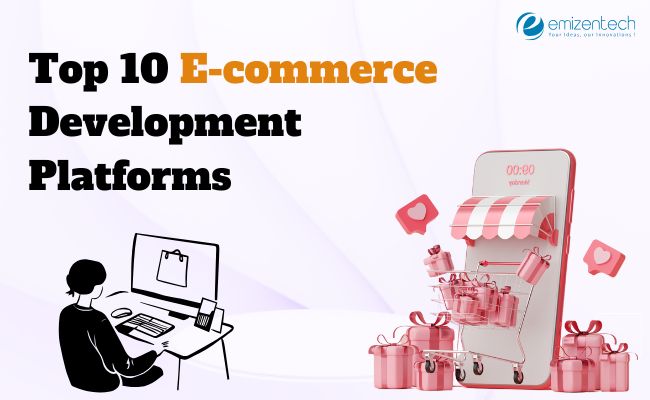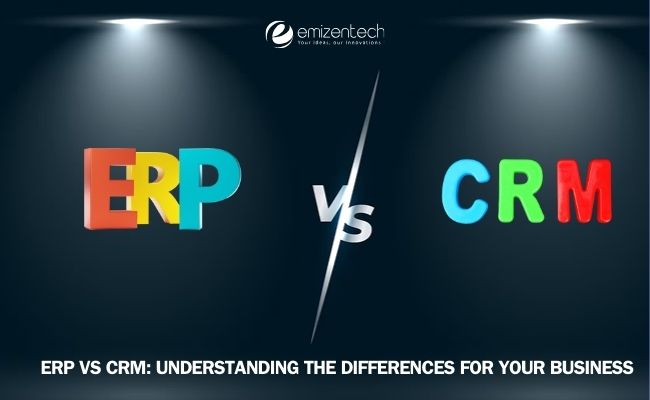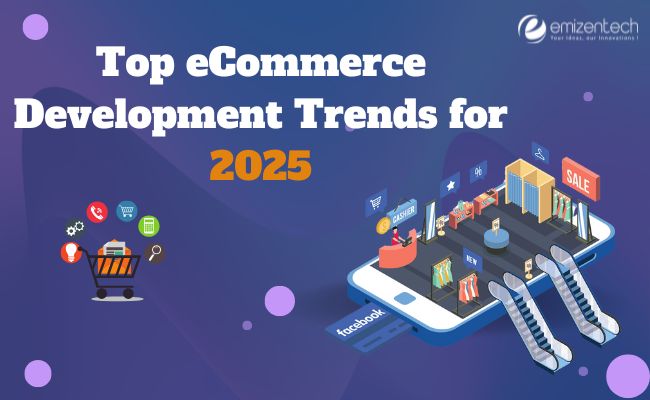Top 10 E-commerce Development Platforms

Strong 8k brings an ultra-HD IPTV experience to your living room and your pocket.
E-commerce has revolutionized the way businesses sell products and services. Whether you’re launching a small online store or scaling an enterprise-level e-commerce business, choosing the right development platform is critical. The right platform can simplify store management, improve customer experience, and boost sales. With so many e-commerce platforms available, selecting the best one can be overwhelming. Each platform offers unique features, pricing, and capabilities that cater to different business needs. From user-friendly platforms like Shopify and Wix to powerful, scalable solutions like Magento and BigCommerce, businesses have a range of options to choose from. In this article, we will explore the top 10 e-commerce development platforms, highlighting their features, benefits, and best use cases. Whether you're a startup, a small business, or a large enterprise, understanding these platforms will help you make an informed decision for your online store.
1. Shopify
Shopify is a leading e-commerce platform known for its ease of use and robust features. It offers a drag-and-drop website builder, secure hosting, and 100+ customizable themes. Businesses can sell across multiple channels, including Facebook, Instagram, and Amazon. With built-in payment gateways and extensive app integrations, Shopify simplifies store management. Its scalable plans make it ideal for startups and growing businesses. Shopify also provides 24/7 customer support, making it a reliable choice for entrepreneurs looking for a hassle-free e-commerce solution.
Key Features:
- Drag-and-drop website builder
- Secure hosting with SSL encryption
- 100+ customizable themes
- Multi-channel selling (Facebook, Instagram, Amazon)
- Integrated payment gateways like PayPal and Stripe
Who Should Use Shopify?
Shopify is ideal for small to medium-sized businesses looking for a straightforward, all-in-one e-commerce solution.
2. WooCommerce
WooCommerce is a powerful open-source e-commerce plugin for WordPress. It allows businesses to sell unlimited products with flexible payment and shipping options. WooCommerce is highly customizable, offering thousands of themes and extensions. It’s SEO-friendly, making it easier to rank on search engines. The platform supports multiple currencies, integrates with various payment gateways, and offers strong analytics tools. Ideal for WordPress users, WooCommerce provides full control over store design and functionality while being a cost-effective solution for e-commerce businesses.
Key Features:
- Open-source and customizable
- Supports unlimited products and categories
- Flexible payment and shipping options
- SEO-friendly with WordPress integration
- Large library of plugins and extensions
Who Should Use WooCommerce?
WooCommerce is best for businesses that already use WordPress and need a cost-effective, scalable e-commerce solution.
3. Magento
Magento is a robust, open-source e-commerce platform designed for large-scale businesses. It offers advanced product management, multi-store functionality, AI-powered recommendations, and strong security features. With a scalable architecture, Magento supports thousands of products and high-traffic websites. It provides extensive customization options, allowing businesses to create unique shopping experiences. Magento’s powerful analytics and reporting tools help optimize sales and marketing strategies. Though it requires technical expertise, it’s ideal for enterprises looking for a highly flexible, feature-rich, and scalable e-commerce solution.
Key Features:
- Advanced product management
- Multiple storefronts under one account
- AI-powered recommendations
- Scalable architecture for large inventories
- Strong security and compliance features
Who Should Use Magento?
Magento is ideal for businesses that need a robust, feature-rich e-commerce platform with advanced customization capabilities.
4. BigCommerce
BigCommerce is a fully hosted e-commerce platform known for its scalability and built-in marketing features. It supports multi-channel selling, SEO optimization, and customizable templates. BigCommerce has no transaction fees, making it cost-effective for businesses. It integrates with Amazon, eBay, and social media platforms, expanding reach. The platform also offers advanced analytics and inventory management. With strong security and performance optimization, BigCommerce is ideal for growing businesses looking for a robust and easy-to-manage e-commerce solution with minimal reliance on third-party apps.
Key Features:
- No transaction fees
- Mobile-responsive themes
- Multi-channel selling (Amazon, eBay, Facebook)
- Advanced analytics and reporting
- Built-in SEO features
Who Should Use BigCommerce?
BigCommerce is best for medium to large businesses that need a scalable, feature-rich platform with minimal reliance on third-party apps.
5. Squarespace
Squarespace is a user-friendly e-commerce platform known for its stunning, professionally designed templates. It offers mobile-responsive themes, built-in marketing tools, secure payment processing, and inventory management. Squarespace is ideal for small businesses, artists, and entrepreneurs who prioritize aesthetics and simplicity. The drag-and-drop editor makes it easy to customize stores without coding. With strong SEO features, businesses can attract more customers. Squarespace also provides integrated blogging and email marketing tools, making it a great choice for creative professionals and small online stores.
Key Features:
- Professionally designed templates
- Mobile-friendly and responsive design
- Secure payment processing
- Inventory and order management
- Integrated marketing and SEO tools
Who Should Use Squarespace?
Squarespace is ideal for small businesses, artists, and entrepreneurs who prioritize design and simplicity.
6. Wix eCommerce
Wix eCommerce is a beginner-friendly platform offering a simple drag-and-drop interface for building online stores. It includes built-in payment processing, customizable product pages, SEO tools, and various marketing features. Wix supports mobile-optimized storefronts, making shopping seamless for customers. Businesses can integrate multiple payment methods and manage inventory efficiently. The platform is ideal for small businesses and entrepreneurs looking for an affordable and easy-to-use e-commerce solution. With various templates and app integrations, Wix eCommerce provides flexibility for different business needs.
Key Features:
- Drag-and-drop editor
- Built-in payment processing
- Customizable product pages
- SEO and marketing tools
- Affordable pricing
Who Should Use Wix eCommerce?
Wix is best for small businesses and individuals who need an easy-to-use e-commerce solution with basic features.
7. PrestaShop
PrestaShop is a free, open-source e-commerce platform offering extensive customization options. It supports multi-language and multi-currency features, making it ideal for international businesses. With a strong community and thousands of add-ons, businesses can enhance functionality as needed. PrestaShop is SEO-friendly and integrates with multiple payment gateways. While it requires some technical knowledge, it’s a cost-effective solution for businesses looking for a scalable and highly customizable online store. The platform is best suited for small to medium-sized businesses seeking flexibility in store development.
Key Features:
- Free to use with paid modules
- Multi-language and multi-currency support
- Strong community support
- SEO-friendly architecture
- Secure and flexible payment options
Who Should Use PrestaShop?
PrestaShop is ideal for small to medium-sized businesses looking for an open-source, budget-friendly solution.
8. Shopware
Shopware is a flexible, modular e-commerce platform designed for growing businesses. It offers an API-first architecture, a drag-and-drop page builder, and AI-driven analytics. The platform supports omnichannel selling and provides a scalable solution for businesses expanding their digital presence. Shopware’s customizable nature allows for tailored customer experiences. It also features strong SEO capabilities and integration with third-party tools. With its scalable structure, Shopware is ideal for medium to large businesses that need a feature-rich, future-proof e-commerce solution with advanced customization options.
Key Features:
- API-first architecture for easy integrations
- Drag-and-drop page builder
- AI-driven analytics and insights
- Scalable for large businesses
- Strong support for omnichannel selling
Who Should Use Shopware?
Businesses that need a future-proof, customizable e-commerce platform with modular features.
9. OpenCart
OpenCart is a lightweight, open-source e-commerce platform that offers extensive customization. It features multi-store management, a user-friendly dashboard, SEO-friendly tools, and multiple payment gateway integrations. OpenCart’s large library of extensions allows businesses to enhance functionality without heavy coding. It is ideal for small businesses and startups looking for a cost-effective e-commerce solution. While it requires some technical knowledge for setup, OpenCart provides flexibility and control over store management, making it a great choice for businesses seeking a customizable online store.
Key Features:
- Multi-store management
- Large library of extensions
- SEO-friendly features
- Multiple payment gateways
- User-friendly admin dashboard
Who Should Use OpenCart?
Startups and small businesses looking for a cost-effective e-commerce solution with customization flexibility.
10. Volusion
Volusion is an all-in-one e-commerce solution with built-in business and analytics tools. It offers no transaction fees, secure checkout, advanced inventory management, and customizable themes. Volusion provides strong marketing features, including SEO and social media integration. Businesses benefit from detailed analytics that help track sales performance and customer behavior. The platform is ideal for businesses that require strong analytics and data-driven insights. While not as popular as some competitors, Volusion remains a reliable choice for businesses looking for an intuitive and feature-packed e-commerce solution.
Key Features:
- No transaction fees
- Secure checkout process
- Advanced inventory management
- Built-in marketing tools
- Customizable themes
Who Should Use Volusion?
Businesses that need an all-in-one platform with advanced analytics and inventory management features.
Choosing the Right E-commerce Development Platforms
Selecting the best e-commerce development platforms is crucial for building a successful online store. With so many platforms available, businesses must consider several factors before making a decision. Ease of use is essential, especially for beginners, while customization options allow businesses to create unique shopping experiences. Scalability ensures that the platform can grow with your business, and security features protect customer data and transactions. Additionally, pricing and transaction fees vary between platforms, affecting overall costs. Whether you're a startup or an enterprise, choosing the right platform will directly impact your store’s performance, sales, and long-term growth.
Conclusion
E-commerce development platforms play a crucial role in creating, managing, and scaling online stores. Whether you’re a small business looking for an easy-to-use platform like Shopify or Wix, or a large enterprise needing a powerful solution like Magento or BigCommerce, choosing the right platform is essential. Each platform has its own strengths and weaknesses, and selecting the right one depends on your business model, budget, and technical expertise. For businesses looking for a seamless and customized online store, working with the best e-commerce development company can make all the difference. With the right e-commerce development platform, you can create an online store that attracts customers, boosts sales, and sets your business up for long-term success.
FAQs
1. What is the best platform for e-commerce development?
Shopify, WooCommerce, and Magento are among the top choices based on business needs.
2. Is WooCommerce better than Shopify?
WooCommerce offers more flexibility, while Shopify is easier to use.
3. How much does it cost to build an e-commerce website?
Costs vary depending on the platform, customization, and additional features.
4. Can I create an online store without coding?
Yes, platforms like Shopify, Wix, and Squarespace allow no-code development.
5. Why should I hire an e-commerce development company?
A best e-commerce development company ensures your store is optimized, secure, and ready to scale.
Note: IndiBlogHub features both user-submitted and editorial content. We do not verify third-party contributions. Read our Disclaimer and Privacy Policyfor details.







